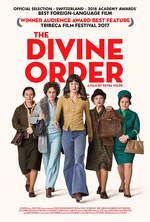Film Screening 17th October, 2018

The Divine Order (Die göttliche Ordnung)
7:30 PM, 17th October, 2018
- M
- 97 mins
- 2017
Presented in partnership with the Embassy of Switzerland
Until a referendum held in 1971, Switzerland was one of only two European countries in which – and I must word this carefully – men but not women were allowed to vote. The other country was neighbouring Liechtenstein, in which a concurrent referendum failed to pass, and women didn’t get the vote until they tried again in 1984.
Why was Switzerland so behind the times? Don’t look to this film for an answer: you’d get the impression it was because its males were more chauvinistic than those across the border in, say, Austria, and even if this was the case, it’s not the reason.
The Divine Order isn’t the story of why Switzerland was different (which is interesting, and less to the country’s discredit than you might think), or even of how the referendum of 1971 was won. It’s the story of one woman in a rural village who lives through these events, takes part in them, and renegotiates a treaty, so to speak, with the men in her life. It’s a warm and, in a curious way, apolitical crowd-pleaser, in which the liberation of the referendum is not the only liberation we’re seeing.
Henry Fitzgerald